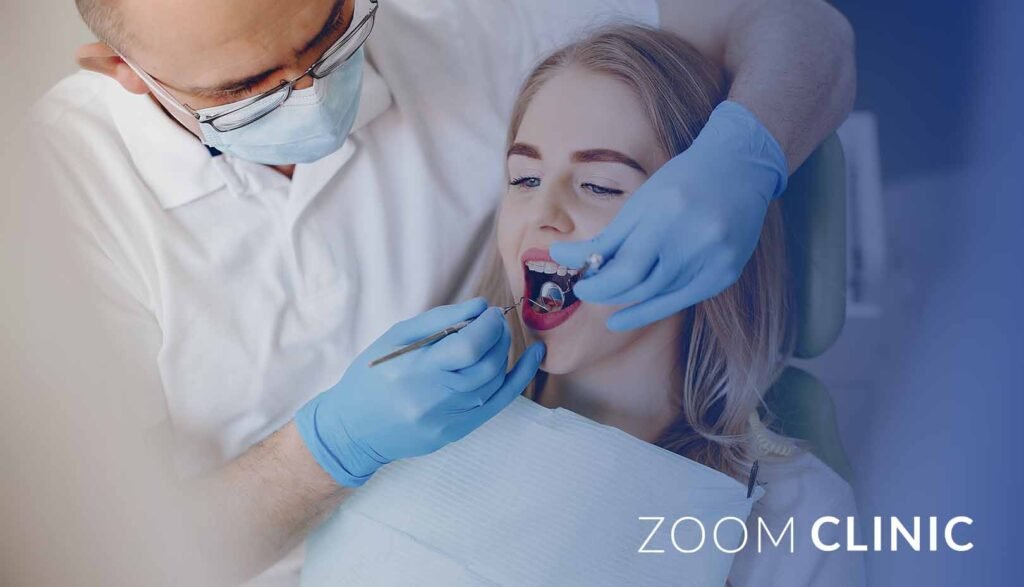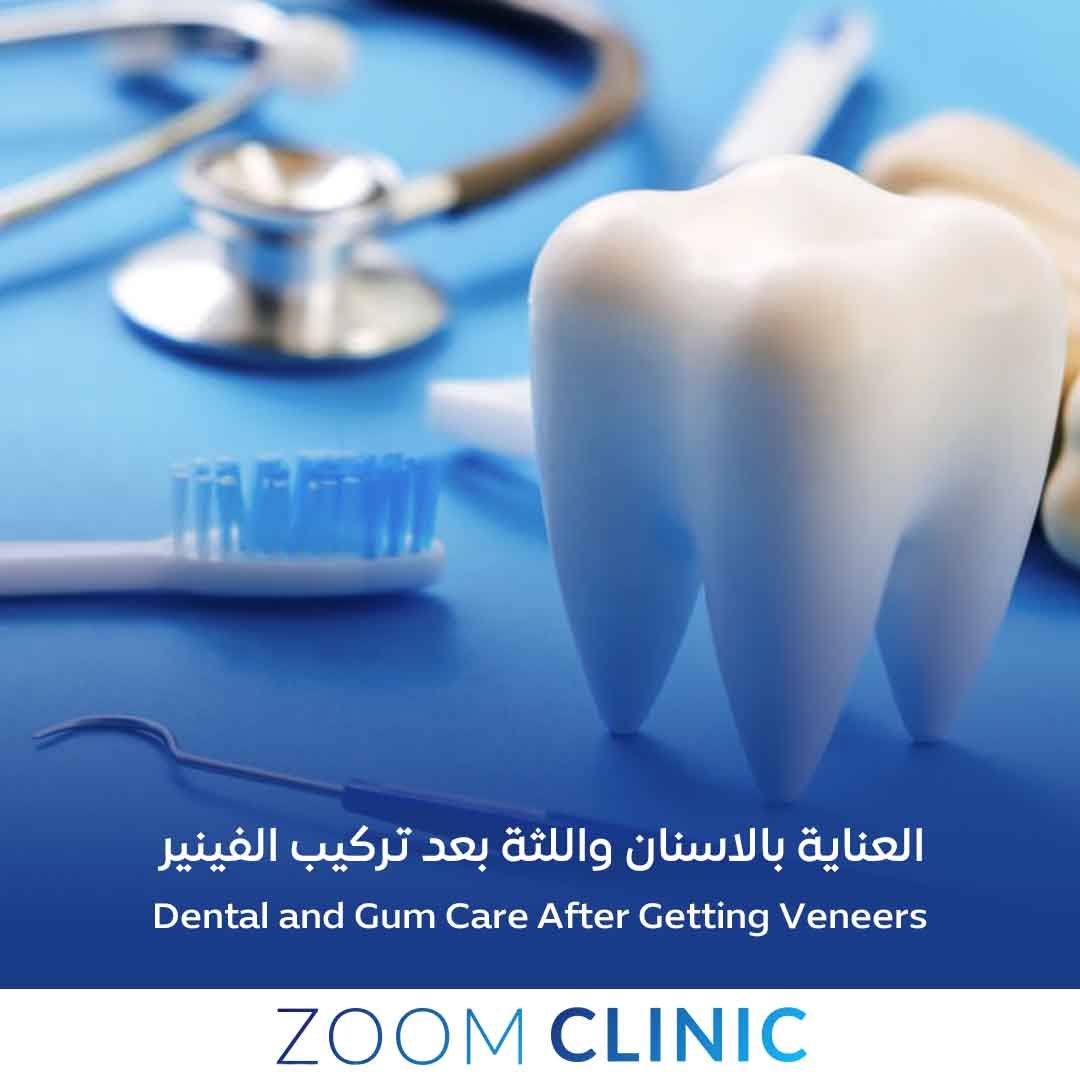Veneers are a popular choice for transforming your smile, providing a flawless, natural appearance.
However, achieving and maintaining that perfect smile goes beyond the veneer installation process. Proper care for your teeth and gums after getting veneers is crucial to preserve their beauty and to ensure your overall oral health. This comprehensive guide will walk you through the best practices for Teeth and gum care after veneer installation.
Table of content
What is a Veneer?
Before diving into the aftercare, let’s take a moment to understand what veneers are. Veneers are thin, custom-made shells of tooth-colored materials designed to cover the front surface of teeth. They are used to improve the appearance of teeth that are discolored, chipped, misaligned, or have gaps. Veneers are typically made from porcelain or composite resin and are bonded to the tooth with a strong adhesive. They offer a long-lasting solution for enhancing your smile, giving a natural, flawless appearance.
The veneer procedure usually requires minimal tooth preparation, where a small amount of enamel is removed to allow the veneer to fit perfectly. Once the veneer is bonded, it blends seamlessly with your natural teeth, making it a popular choice for those looking to upgrade their smile.
The Importance of Post-Veneer Care
Once your veneers are installed, the aftercare becomes a critical part of ensuring the longevity of the veneers and your oral health. Veneers are designed to be durable, but they need your assistance to stay in pristine condition. Failing to properly care for your teeth and gums can lead to a range of problems, including decay, gum disease, and veneer damage.
By following a good oral care routine, you can maintain the look and function of your veneers while keeping your teeth and gums healthy. Proper aftercare includes maintaining oral hygiene, avoiding harmful habits, and visiting your dentist regularly.
Why is Gum Care Important After Having Veneers Installed?

Gum care is crucial after getting veneers because healthy gums are the foundation of a beautiful smile. Veneers do not protect the gums from inflammation or disease, which means poor gum health can lead to issues such as gum recession. When gums recede, the edges of the veneers can become exposed, affecting the overall appearance and stability of the veneers. Additionally, inflamed or infected gums can compromise the adhesive bond between the veneers and the natural teeth, leading to potential veneer failure. Proper gum care helps maintain the integrity of both the veneers and the natural teeth beneath them, ensuring a lasting and healthy smile.
Tips for Teeth and Gum Care After Veneer Installation
1. Maintain Proper Oral Hygiene
The foundation of a beautiful smile with veneers is good oral hygiene. Veneers may be resistant to staining and decay, but the natural teeth beneath them are not, and your gums are still susceptible to disease. Here are some essential hygiene tips:
Brush Twice a Day: Use a soft-bristled toothbrush and non-abrasive toothpaste to clean your teeth and veneers. Hard bristles or abrasive toothpaste can damage the surface of the veneers. Brush for at least two minutes, ensuring you reach all areas of your mouth.
Floss Daily: Flossing helps remove plaque and food particles from between your teeth and under the gumline. Be gentle when flossing to avoid damaging the veneers or irritating the gums. Consider using dental floss specifically designed for sensitive areas if needed.
Use Antibacterial Mouthwash: Rinsing with an antibacterial mouthwash helps reduce plaque buildup and maintains gum health. Choose an alcohol-free mouthwash to avoid weakening the veneer adhesive over time.
2. Avoid Hard and Sticky Foods
Veneers are strong, but they can be damaged if exposed to certain foods. To maintain the longevity of your veneers, you should:
Avoid Hard Foods: Chewing on hard foods like ice, nuts, or hard candies can put stress on your veneers and potentially cause them to crack or chip. If you do eat harder foods, try cutting them into smaller pieces to make them easier to chew.
Minimize Sticky Foods: Sticky foods such as caramel and certain candies can dislodge your veneers. They can also stick to your teeth, increasing the risk of decay and plaque buildup. Try to minimize your intake of such foods, or brush and floss immediately after eating them.
Cut Down on Sugary Foods and Drinks: Sugary foods can lead to tooth decay, which will compromise the health of the natural tooth beneath the veneer. Try to limit sugary snacks and beverages, and always follow up with proper oral hygiene.
3. Protect Your Veneers from Damage
Veneers are not indestructible, so taking extra precautions is necessary to keep them intact:
Wear a Mouthguard During Physical Activities: If you participate in sports or other activities where there’s a risk of facial impact, wearing a mouthguard is essential. A blow to the face could damage both your veneers and your natural teeth.
Avoid Using Teeth as Tools: Don’t use your teeth to open bottles, tear packages, or as a tool for any other non-food-related purpose. This behavior can put undue pressure on your veneers and cause them to chip or crack.
Consider a Nightguard if You Grind Your Teeth: Bruxism (teeth grinding) can put significant stress on veneers. If you grind your teeth at night, wearing a custom-made nightguard can help protect your veneers and prevent damage.
4. Watch for Gum Health
Healthy gums are the foundation of a great smile. If your gums are not properly cared for, your veneers won’t last as long, and your overall oral health could be compromised.
Gum Sensitivity After Veneer Installation: Some people may experience gum sensitivity or irritation after getting veneers. This is normal and usually subsides after a few days. During this period, ensure you maintain a gentle cleaning routine and avoid irritating substances like spicy foods or alcohol.
Look Out for Gum Disease Symptoms: Signs of gum disease include redness, swelling, bleeding while brushing or flossing, and persistent bad breath. If you notice any of these symptoms, consult your dentist immediately. Gum disease can lead to recession around the veneers, making them more noticeable and affecting their appearance.
5. Visit Your Dentist Regularly
Regular dental visits are an essential part of veneer aftercare. Your dentist will not only check the condition of your veneers but also monitor your overall oral health to prevent problems from developing.
Biannual Checkups: Visit your dentist every six months for routine checkups and professional cleanings. Your dentist can remove tartar buildup, which is difficult to clean at home, and examine your veneers to ensure they are in good shape.
Veneer Maintenance: During your visits, your dentist will also check for any issues with your veneers, such as chips or cracks. They can polish them to keep them looking shiny and can recommend repairs if necessary.
How is the Gum Care Session Performed After Veneer Installation?

A gum care session after veneer installation typically involves professional cleaning to remove plaque and tartar buildup around the gums. Your dentist or hygienist will use specialized tools to gently clean the gumline and ensure there is no buildup that could lead to inflammation or gum disease. The session may also involve checking for any early signs of gum problems and providing tailored advice on maintaining gum health at home. This professional cleaning helps keep the gums healthy, which is vital for the stability and appearance of your veneers.
During the session, your dentist may also provide polishing for your veneers to keep them looking shiny and new. This regular maintenance is essential to prevent dullness and to ensure that the veneers continue to blend seamlessly with your natural teeth.
What to Expect Immediately After Veneer Installation
Right after getting your veneers installed, it is natural to feel some mild discomfort, sensitivity, or an unusual bite. These issues are generally temporary and should subside as you get used to your veneers. Here’s what to expect in the initial days and how to manage them:
Tooth Sensitivity: You may experience some sensitivity to hot and cold, which is normal after the bonding process. This sensitivity will gradually subside over a few weeks. To manage it, use a toothpaste designed for sensitive teeth and avoid very hot or cold foods and drinks.
Adjusting to the Veneers: Veneers might initially feel different from your natural teeth. You may notice slight changes in your bite or the way your teeth fit together. This is normal and will improve over time. If you continue to feel discomfort after a few weeks, contact your dentist for a bite adjustment.
Maintaining Your Beautiful Smile
1. Avoid Stain-Causing Substances
While porcelain veneers are resistant to staining, the natural teeth around them can still get discolored. To maintain a uniform smile:
Minimize Dark-Colored Foods and Drinks: Coffee, red wine, tea, berries, and other dark-colored foods and drinks can stain the natural teeth next to your veneers, leading to a less consistent appearance. It’s best to rinse your mouth with water or brush your teeth after consuming such substances.
Quit Smoking: Smoking can cause severe staining of natural teeth and may even impact the edges of your veneers, leading to an inconsistent look. It’s best to quit smoking entirely to preserve your smile and improve your overall health.
2. Stick to a Healthy Diet
A healthy diet is beneficial not only for your overall health but also for your oral health. Here are some diet tips:
Eat a Balanced Diet: Focus on eating a diet rich in fruits, vegetables, lean proteins, and dairy products to keep your teeth and gums healthy. A balanced diet helps provide the essential nutrients needed to maintain oral tissue and bone structure.
Avoid Acidic Foods and Drinks: Acidic foods and drinks can erode the bonding material of the veneers and weaken the enamel of your natural teeth. Limit acidic items such as citrus fruits, soda, and pickles, or rinse your mouth with water after consuming them.
Long-Term Care for Veneers
With proper care, veneers can last 10-15 years or even longer. Maintaining them involves:
Regular Polishing: Veneers need occasional polishing by your dentist to keep them looking as good as new. This helps maintain their natural sheen and prevents dullness.
Being Mindful of Oral Hygiene Practices: Though veneers are resistant to decay, the underlying tooth structure remains vulnerable. Consistent oral hygiene helps protect the natural teeth and ensure the longevity of your veneers.
Addressing Any Issues Promptly: If you notice any chips, cracks, or changes in how your veneers feel, don’t delay in visiting your dentist. Prompt attention can prevent minor problems from becoming significant concerns.
How Veneers Impact Your Oral Hygiene Routine
Veneers change the appearance of your smile, but they do not significantly alter your oral hygiene routine. It’s important to realize that the natural tooth underneath the veneer is still susceptible to decay, and the surrounding gums require the same level of care to stay healthy.
Changes in Brushing and Flossing Techniques: While there are no major changes required in your oral hygiene techniques, it’s essential to ensure you’re gentle yet thorough, especially at the veneer margins where they meet the natural tooth. Brushing too aggressively can wear down the gumline and make the edge of your veneer more noticeable.
Dealing with Plaque and Tartar: Since veneers cover the front surface of the teeth, it might be slightly more challenging to detect plaque buildup. Ensure that you keep up with regular professional cleanings and use good brushing techniques to prevent tartar from forming.
Common Myths About Veneer Care

There are some misconceptions about veneers and their aftercare that can lead to confusion:
Myth 1: Veneers Do Not Require Special Care – While veneers are durable and low-maintenance, they do require careful brushing, flossing, and regular dental visits to maintain their appearance and health.
Myth 2: Veneers Are Permanent and Cannot Be Damaged – Veneers, though strong, are still vulnerable to damage from poor habits like chewing ice or using teeth as tools. Taking proper precautions is key to their longevity.
Myth 3: Veneers Do Not Affect Gum Health – Veneers themselves do not cause gum disease, but poor oral hygiene can lead to plaque buildup and gum inflammation. Healthy gums are essential for maintaining a beautiful smile with veneers.
Why Choose Us for Gum Treatment Around Veneers?
At Zoom Clinic, we pride ourselves on providing exceptional care for patients with veneers. Our experienced dental team understands the importance of maintaining healthy gums for the longevity of your veneers and your overall oral health. We offer personalized gum care sessions that ensure your veneers remain in perfect condition and your gums stay healthy.
Expert Care: With over 10 years of experience, our dental professionals are skilled in handling the unique requirements of gum care for veneer patients. We use advanced techniques and tools to provide thorough cleaning without compromising the veneers.
Customized Treatment Plans: Every patient is unique, and we provide tailored gum care sessions to meet your specific needs. Whether it’s regular maintenance or addressing a particular issue, our team is here to support your oral health journey.
State-of-the-Art Facility: Zoom Clinic is equipped with the latest technology to provide effective and comfortable gum care treatments. Our focus is on delivering the best possible experience for our patients while ensuring optimal results.
Frequently Asked Questions
1. How long do veneers last?
With proper care, veneers can last between 10-15 years or even longer. Regular dental visits, good oral hygiene, and avoiding damaging habits can help extend the lifespan of your veneers.
2. Are veneers prone to staining?
Porcelain veneers are highly resistant to staining, unlike natural teeth. However, the natural teeth surrounding the veneers can still stain, so it’s essential to maintain a consistent oral care routine.
3. Can I eat normally after getting veneers?
Yes, you can eat most foods after getting veneers. However, you should avoid very hard or sticky foods that could damage the veneers. It’s also advisable to cut hard foods into smaller pieces to avoid putting excess pressure on the veneers.
4. How often should I visit the dentist after getting veneers?
It is recommended to visit your dentist every six months for routine checkups and professional cleanings. This helps in maintaining both your veneers and your overall oral health.
5. Will getting veneers hurt?
The veneer installation process is generally not painful, as your dentist will use local anesthesia to minimize discomfort. After the procedure, you may experience mild sensitivity, which typically subsides after a few days.
Conclusion: A Lifelong Smile with Proper Care
Veneers are an excellent solution for enhancing your smile, but their longevity and appearance depend largely on how well you care for your teeth and gums after installation. Proper oral hygiene, regular dental visits, and lifestyle adjustments are all part of the equation for keeping your veneers looking as good as new.
At Zoom Clinic, we provide comprehensive support for all your dental needs, from the initial consultation to the aftercare. If you have any questions about your veneers or need guidance on maintaining your beautiful smile, don’t hesitate to contact our experienced team. Zoom Clinic is dedicated to helping you achieve and maintain the smile of your dreams.
Remember, a flawless smile is a healthy smile. By taking care of your teeth and gums after veneer installation, you ensure that your new smile will stay stunning for years to come. Whether it’s regular cleanings, adjusting your diet, or avoiding harmful habits, every step you take towards oral health helps preserve your investment in a beautiful smile.
Get the special offer today from Zoom Clinic
:Read Also
The Difference Between Veneers and Zirconium


